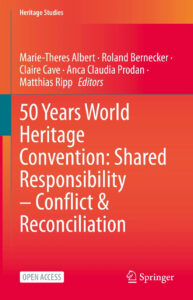
Download: Flyer
Veröffentlicht: 2022
Buch von springer.de herunterladen mit diesem Open Access-Link.
Die vollständige Serie “Heritage Studies Series“ auf springer.de.
Besprechungen:
- Dr. Klaus Hüfner
- ISG Magazin (International Städteforum Graz)
- Forschnung & Lehre
INHALT / TABLE OF CONTENTS
Part I: Introduction
- Introduction into the overall message of the book: Destruction of Heritage is destroying identity – Shared Responsibility is therefore our common task for the future
Marie-Theres Albert, Roland Bernecker, Claire Cave, Anca Claudia Prodan & Matthias Ripp - 50 Years World Heritage Convention: Founding Idea(s) and Implementation – Reflections on Important Developments over Time
Birgitta Ringbeck
Part II: The Destruction of Heritage is Multidimensional – Theoretical Reflections, Case Studies and Narratives
Global Governance
- UNESCO’s World Heritage Convention and Global Governance
Roland Bernecker & Nicole Franceschini - Coloniality, Natural World Heritage and Indigenous Peoples: A Critical Analysis of World Heritage Cultural Governance
Irene Fogarty - Governing World Heritage – Taking Stock of the Structures that Determine the Protection and Conservation of World Heritage Sites
Eike Tobias Schmedt - World Heritage and Global Governance: Thematic Reflections
Roland Bernecker & Nicole Franceschini with contributions from Webber Ndoro, Christina Cameron, Maritta Koch-Weser, Lynn Meskell, Caroline Capdepon de Bigu-Poirrier, Boyoon Choi, Roger Negredo Fernández, Isabelle Rupp & Tanja Willhalm
Urban Transformation
- Urban Transformation and Related Conflicts at UNESCO World Heritage Sites
Christer Gustafsson & Matthias Ripp - Temporary Uses as a Toolkit for Heritage-led Sustainable Urban Development
Mariko Ikeda - Going beyond Tourism Attraction in the Festivalisation of World Heritage Cities
Zachary M. Jones - Sustainable Urban Heritage vs Heritage Orthodoxy
Dennis Rodwell - The Politics of Shared Heritage: Contested Histories and Participatory Memory Work in the Post-Colonial Urban Landscape
Jan Küver
War and Terrorism
- UNESCO World Heritage and Cultural Property Protection in the Event of Armed Conflict
Friedrich Schipper - Palmyra: Bridging Past and Future
Zeina Elcheikh - Countering the Narratives of Destruction: Textual Evidence and the Tradition of Heritage Preservation in Islam
Azeez Olaniyan & Akeem O. Bello - The Role of Heritage in Post-War Reconciliation: Going Beyond World Heritage Sites
Lorika Hisari, Kristen Barrett-Casey & Kalliopi Fouseki, - Fighting Terrorist Attacks against World Heritage – An Integrated Approach
Sabine von Schorlemer
Climate Change
- Climate Change and World Heritage: An Introduction
Claire Cave - The Climate Crisis, Outstanding Universal Value and Change in World Heritage
William P. Megarry - Climate Action and World Heritage: Conflict or Confluence?
Cathy Daly - Conflict Areas and Solution Strategies in the Conservation of Ecosystems and Their Services: A Holistic Approach
Esteban Avigliano & Nahuel Schenone - Historic Gardens as a Cultural Task: Climate Adaptation Strategies and Understanding of Nature
Michael Rohde - The Highest Mountain in the Shadow of Climate Change: Managing Tourism and Conservation in a World Heritage Site: Sagarmatha National Park, Nepal
Sushma Bhatta, Robin Boustead & Kurt Luger
Technological Change
- Technological Change: Risk or Opportunity for UNESCO World Heritage?
Alexander Siegmund & Anca Claudia Prodan - Change in Water Technology in Anatolia: From Use to Energy, Conflicts to Climate Action
Yonca Erkan - Mineral Extractive Industries in the Context of European World Heritage Cultural Landscape Conservation and Management: The Case Study of the Erzgebirge/Krušnohoří Mining Region
Friederike Hansell
- Cultural Landscape Compatibility Study Upper Middle Rhine Valley – A ProActive Tool for Preventive Monitoring of Complex World Heritage Landscapes
Michael Kloos - Geoheritage to Support Heritage Authorities: Research Case Studies on Maya Archaeological Sites
Mario Hernández, Philippe De Maeyer, Luc Zwartjes & Antonio Benavides Castillo - Adopting Digital Tools & Technology to Evolve Sustainable Tourism at World Heritage Sites: Case Studies from India and Greece
George N. Zaimes, Valasia Iakovoglou, Fergus T. Maclaren & Pankaj Manchanda
Commodification of Heritage
- The Commodification of World Heritage: A Marxist Introduction
Thomas M. Schmitt - Tourism without Commodification at a Hungarian World Heritage Site
Lia Bassa - Natural Heritage in Danger. Native Forests, New and Old Forms of Extractive Activities and Sustainability from the Perspective of a New Generation of Scientists, Activists and Entrepreneurs in Argentina
Claudia Lozano - Shifting Scales in the Honghe Hani Rice Terraces: Traditional Knowledge, Commodification and Community Participation
Fabienne Wallenwein
Part III: The World Heritage Convention – The Day after Tomorrow
- Shared Responsibility – A Guiding Principle of the World Heritage Convention – Perception – Implementation – Future
Marie-Theres Albert - World Heritage and Reconciliation
Birgitta Ringbeck - Sustainability – A Guiding Principle of the World Heritage Convention – What has Been Achieved – What is Missing – What is the Future Perspective
Constanze Fuhrmann - World Heritage Education and the Next 50 Years of the Convention: Current Pitfalls and Future Potentials of World Heritage Education
Claudia Grünberg & Klaus-Christian Zehbe - Young Professionals’ Perspectives on World Heritage – Transformation from an Expert-dominated Concept to a Project for the People it is Made for
Roland Bernecker, Juan Carlos Barrientos García, Elisabeth Korinth, Isabelle Rupp, Giulia Tomasi, Klaus-Christian Zehbe - Outlook
Marie-Theres Albert, Roland Bernecker, Claire Cave, Anca Claudia Prodan & Matthias Ripp
Weitere Ausgaben aus der Reihe Heritage Studies
- Cultural Heritage Protection in Korea – Contents of Law and Policy and their Changes in Relation to International Conventions
- Handbook on Intangible Cultural Practices as Global Strategies for the Future
- Claiming Back Their Heritage: Indigenous Empowerment and Community Development through World Heritage
- Dance Practices as Research – Approaches to the Safeguarding and Transmission of the Intangible Cultural Heritage of Dance
- Ein Metamodel für Kulturerbe-basierte Stadtentwicklung – Aktivierung von nachhaltiger Entwicklung durch städtisches kulturelles Erbe
- Intangible Cultural Heritage and Sustainable Development: The Valorisation of Heritage Practices
- The UNESCO Memory of the World Programme: Key Aspects and Recent Developments
- Going Beyond – Perceptions of Sustainability in Heritage Studies No. 2
- Perceptions of Sustainability in Heritage Studies
- 40 Jahre Welterbekonvention
- Understanding Heritage

Sie müssen angemeldet sein, um einen Kommentar zu veröffentlichen.